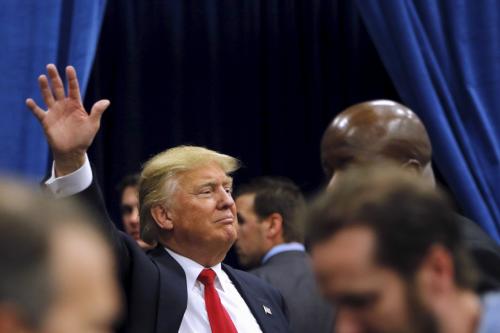Have white evangelical voters become born-again converts to situation ethics? A survey released today puts this question squarely on the table.
The Public Religion Research Institute asked a large random sample of Americans a blunt question: “Do you think an elected official who commits an immoral act in their private life can still behave ethically and fulfill their duties in their public and professional life?” Over the past five years, Americans have shifted toward a more accommodating stance. In 2011, only 44 percent believed that politicians could be immoral in private and still perform their public duties in an ethical manner. Now, this position commands 61 percent support. It is endorsed by 61 percent of Democrats (up 12 points since 2011) and by 70 percent of Republicans (up a whopping 34 points).
The breakdown along religious lines is instructive. Americans without any religious affiliation haven’t shifted much—63 percent in 2011, 60 percent today. Catholic acceptance of politicians’ personal misconduct has increased from 42 to 58 percent. White mainline Protestant support is up by 22 points, from 38 to 60 percent.
These large shifts are dwarfed, however, by the change among white evangelicals. In 2011, only 30 percent believed that personal immorality was consistent with an ethical performance of official duties. Today, 72 percent of white evangelicals—up an astounding 42 points–believe that the two can go together.
In a related change, fewer white evangelicals now believe that strong religious beliefs are very important for presidential candidates—49 percent today, versus 64 percent just five years ago.
The survey did not go on to ask why people have changed their minds. But the data are suggestive. Yes, the general public’s center of gravity has shifted toward greater acceptance. But white evangelicals have shifted more than twice as much. As recently as 2011, white evangelicals were the least likely of any religious group (including unaffiliated Americans) to say that personal immorality was compatible with an ethical political life. Today, they are the most likely to affirm this.
Here’s another data point from PRRI’s research. In 2011, 64 percent of white evangelicals said that it was “very important” for presidential candidates to have strong religious beliefs. But now, only 49 percent take this position.
What could have happened to so alter the sentiments of white evangelicals on matters so central to their understanding of the relation between morality, faith, and public life? I can think of only one credible answer: the candidacy of Donald Trump, whose new-found positions on religious liberty, abortion, and the Supreme Court have moved evangelicals to set aside, perhaps only temporarily, their long-held views on the moral and spiritual prerequisites for political office.
In Fear and Trembling, the Protestant theologian Soren Kierkegaard reflected on a question that has troubled Jews for two millennia: How could Abraham have possibly gone along with God’s command to sacrifice Isaac? He argued with God about the fate of Sodom; how could he fail to question a command that contradicted the most fundamental moral principles? Kierkegaard’s famous answer: to be a “knight of faith,” to maintain his relationship with God, Abraham was willing to engage in a “teleological suspension of the ethical.” Even in theological morality, it seems, the end can justify the means.
To say the least, this is a dangerous stance, because not only valued relationships but also one’s spiritual integrity are at risk. You have to be very sure that it is God, not just a voice in your head, urging you to make the sacrifice. And if you get it wrong, you pay a huge price.
One thing is clear: Now that evangelicals have crossed this bridge, they will not be credible if, in some future election, they try to cross back and return to the status quo ante of inviolable principles backed by stern anathemas for dissenters. Henceforth they are in the same boat with the rest of us, judging each individual as an ensemble of good and bad traits. They have forfeited the standing to regard as morally defective those who disagree with their conclusions.
The Brookings Institution is committed to quality, independence, and impact.
We are supported by a diverse array of funders. In line with our values and policies, each Brookings publication represents the sole views of its author(s).








Commentary
Has Trump caused white Evangelicals to change their tune on morality?
October 19, 2016